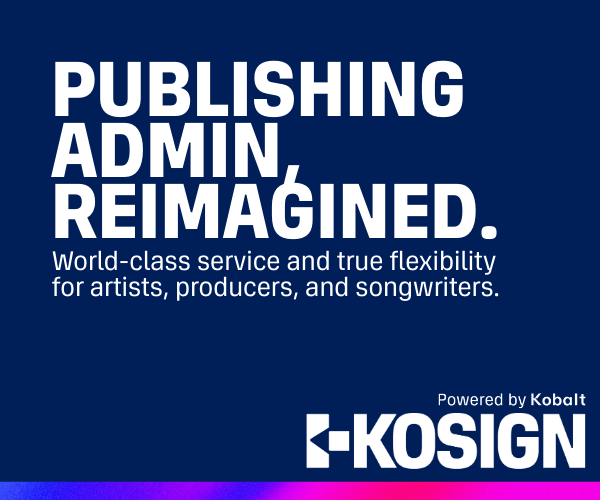MBW Views is a series of op/eds from eminent music industry people… with something to say. The following MBW op/ed comes from Deviate Digital founder Sammy Andrews, who questions not only the actions and policies of DSPs and social media companies regarding racist and misogynistic content, but also the music industry’s reaction (or lack of) to them…
As Women’s History Month draws to a close, I find myself reflecting on an unforgettable moment at the Royal Albert Hall.
As the founder and show director of the inaugural SISTERS: Annie Lennox & Friends, I had the privilege of bringing together some of the most powerful voices in music to raise vital funds and awareness for The Circle, a global feminist organisation dedicated to supporting the most vulnerable women facing violence and injustice worldwide, founded by my client of 20 years, Annie Lennox.
One in three women will face violence in their lifetime. That’s not just a statistic, it’s a global crisis. The Circle has spent the last 17 years directly supporting over 1.4 million people on women’s rights and empowering more than 700,000 women and girls who face violence, discrimination, and fear. This work is more important than ever, especially as women’s rights continue to erode globally in the face of political upheaval and rising extremism.
Yet, as we celebrated solidarity and action at SISTERS, I couldn’t help but think about the darker side of the industry we work in. The music business is increasingly complicit in normalising misogyny, and the platforms that fuel our industry are allowing misogynistic, racist, and hateful content to thrive.
Music and video streaming services as well as socials have of course revolutionised access to music, promotion and revenue for our industry, but they’ve also created an environment where misogynistic and violent content thrives unchecked. Research shows a surge in sexist lyrics within popular music, with 77% of the most-streamed songs in the last decade containing sexist themes. This is no accident, it’s a reflection of the algorithms that push certain content to listeners while marginalising others.
“If platforms relax their policies, misogynistic and racist content won’t just persist, it will be amplified.”
Spotify, for example, has long been criticised for the way its recommendation system favours male artists. A nine-year analysis of listening data revealed that just 25% of recommended artists were female, with users often having to wait until the seventh or eighth suggested track before hearing a female voice. When men dominate the airwaves, so do the messages they push, messages that too often go unchallenged.
And it’s not just music. Earlier this month, a petition calling on Spotify to remove Andrew Tate’s courses on how to traffic women gained traction, highlighting how these platforms profit from misogyny in more ways than one.
Tate, a self-styled influencer notorious for his derogatory views on women, has built a following that is actively encouraged and enabled by the very same platforms the music industry depends on. When YouTube, X, Spotify, TikTok, Amazon, Apple, Instagram & Facebook host his content, it sends a clear message: misogyny is monetisable.
The situation is about to get worse. With Trump back in office, his administration is dismantling what it sees as ‘Big Tech censorship.’ In January 2025, he revoked a 2023 executive order designed to mitigate the risks of AI-driven content amplification, stripping away efforts to curb the spread of misinformation and hate speech.
This move aligns with his broader agenda of protecting ‘free speech’, even when that speech encourages harm. Meta has already responded by dropping its third-party fact-checking initiatives, setting a dangerous precedent for other platforms.
If social media giants like Meta and X are scaling back moderation, how long before every platform our industry relies on follows suit? If controversy generates engagement, which in turn generates revenue, there’s little incentive for these companies to take a stand.
“The music business must decide whether or not it will be part of the machine that allows hate to thrive.”
The music industry presents itself as progressive, celebrating diversity and empowerment when it suits its PR strategy. But when it comes to real action, the hypocrisy is hard to ignore.
Sean ‘Diddy’ Combs, for example, saw a surge in streaming numbers even as serious allegations of sexual assault surfaced. Instead of facing consequences, he benefited from the renewed attention. The same pattern has played out with R. Kelly, Chris Brown and countless others. The platforms that host their music don’t remove them, they profit from the scandal.
Some argue that disclaimers or contextualisation could be a solution, but let’s be honest: when was the last time you saw any platform slap a content warning on a misogynistic track?
The backlash against content moderation isn’t just a social media problem, it will have a huge impact on the music industry. Trump’s pick for FCC chair, Brendan Carr, has made it clear he wants to challenge what he calls the ‘Big Tech cartel.’
If these companies face less pressure to moderate content, misogynistic and hateful material will be given even more visibility. As someone both working within the industry and advocating for women’s rights, I worry about what this means for the future of music.
If platforms relax their policies, misogynistic and racist content won’t just persist, it will be amplified. And if the industry stays silent, it will be complicit in that amplification.
The music business, and the artists within it, must decide whether they will be part of the machine that allows hate to thrive. If misogyny, homophobia, and racism are about to be amplified under the guise of free speech, do we continue to engage with these platforms as if nothing has changed? Or do we push for something better?
The role of an artist has always been more than just making music, it’s about shaping culture. If we stand by while streaming and social giants monetise hate, what does that say about the world we are building? If we allow our music to exist alongside misogynistic and racist rhetoric without protest, are we any better than the platforms profiting from it?
The truth is, we in the music industry have more power than we like to admit. The DSPs rely on us to survive.
If we take a stand, these platforms will have to listen. The question is whether we will. If we continue to sit back while our work is hosted alongside misogynistic, racist, and hateful material, we are all part of the problem.
This isn’t just a moral argument, it’s a business one too. Audiences are more aware than ever of where their money goes, and failing to act could drive them towards more ethical alternatives.
2025 is a turning point. The tech giants are lowering their defences. If we don’t step up now, the platforms we depend on will become even more toxic.
The choice is clear: we either take collective action or accept complicity.

MBUK is available as part of a MBW+ subscription – details through here.
All physical subscribers will receive a complimentary digital edition with each issue.
Music Business Worldwide





